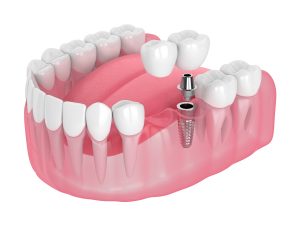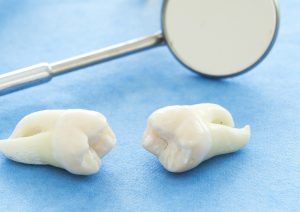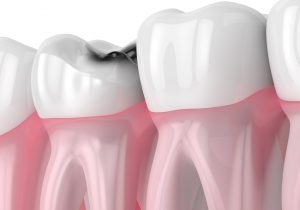 Many people recognize what gum disease is, and the fact that it could become a threat if it’s allowed to develop. However, given the fact that it’s called gum disease, many people who have it are surprised to learn that the condition has affected much more than just the health of their gum tissues. Despite its name, severe gum disease can become a serious threat to much more than just the tissues that surround your teeth, but also your teeth themselves, as well as the rest of your oral and systemic wellbeing. (more…)
Many people recognize what gum disease is, and the fact that it could become a threat if it’s allowed to develop. However, given the fact that it’s called gum disease, many people who have it are surprised to learn that the condition has affected much more than just the health of their gum tissues. Despite its name, severe gum disease can become a serious threat to much more than just the tissues that surround your teeth, but also your teeth themselves, as well as the rest of your oral and systemic wellbeing. (more…)
Why Support a Bridge or Denture on Dental Implants?
 The need to replace a missing tooth can sometimes seem obvious. Besides the appearance of your smile after losing the tooth, you might also notice its absence in the way your teeth feel when you bite and chew, or how you enunciate certain words. However, the importance of choosing the right replacement option might not be as obvious. In addition to replacing the visible part of your tooth, it’s also essential to address the loss of your tooth’s root. That’s why increasingly more patients are choosing to enhance their dental bridges and dentures with the help of dental implants. (more…)
The need to replace a missing tooth can sometimes seem obvious. Besides the appearance of your smile after losing the tooth, you might also notice its absence in the way your teeth feel when you bite and chew, or how you enunciate certain words. However, the importance of choosing the right replacement option might not be as obvious. In addition to replacing the visible part of your tooth, it’s also essential to address the loss of your tooth’s root. That’s why increasingly more patients are choosing to enhance their dental bridges and dentures with the help of dental implants. (more…)
How Much Do You Know About Tooth Loss?
 Before they experienced it, many tooth loss patients already recognized the threat that losing a tooth could pose to their oral health. Many people even realize some of the more common causes behind it, such as gum disease (the most frequent cause). However, the specific ways in which tooth loss occurs and how it impacts the many different aspects of your oral health aren’t always as well-known. Today, we take a closer look at tooth loss, and what you should know about the potential consequences it could have on your oral health if not prevented or addressed promptly. (more…)
Before they experienced it, many tooth loss patients already recognized the threat that losing a tooth could pose to their oral health. Many people even realize some of the more common causes behind it, such as gum disease (the most frequent cause). However, the specific ways in which tooth loss occurs and how it impacts the many different aspects of your oral health aren’t always as well-known. Today, we take a closer look at tooth loss, and what you should know about the potential consequences it could have on your oral health if not prevented or addressed promptly. (more…)
Faster Smile Restoration with CEREC
 There are many different reasons why dental crowns are such a popular restorative dental treatment. On one hand, they’ve been around for centuries, and have continuously proved successful at restoring teeth with a wide range of concerns. On the other hand, today’s dental crowns are also so lifelike in appearance and durable in their construction that they can be utilized for a wide range of restorative and cosmetic purposes. Today, we examine another important aspect of modern dental crowns, particularly those created using CEREC technology that allow for the immediate design and placement of your custom restoration. (more…)
There are many different reasons why dental crowns are such a popular restorative dental treatment. On one hand, they’ve been around for centuries, and have continuously proved successful at restoring teeth with a wide range of concerns. On the other hand, today’s dental crowns are also so lifelike in appearance and durable in their construction that they can be utilized for a wide range of restorative and cosmetic purposes. Today, we examine another important aspect of modern dental crowns, particularly those created using CEREC technology that allow for the immediate design and placement of your custom restoration. (more…)
Important Notes About Tooth Extraction
 For many people, tooth extraction will never have to be part of their dental treatment. For others, however, it can become necessary for a wide variety of potential reasons. Usually, those reasons involve oral health concerns that will only grow worse with time, such as a severe damage to a tooth or an extreme infection that’s consumed most of its structure. If you need tooth extraction, then the good news is that it means you still have a chance of limiting any further potential complications to your oral health, and now have the chance to rebuild your smile with a durable, lifelike replacement. (more…)
For many people, tooth extraction will never have to be part of their dental treatment. For others, however, it can become necessary for a wide variety of potential reasons. Usually, those reasons involve oral health concerns that will only grow worse with time, such as a severe damage to a tooth or an extreme infection that’s consumed most of its structure. If you need tooth extraction, then the good news is that it means you still have a chance of limiting any further potential complications to your oral health, and now have the chance to rebuild your smile with a durable, lifelike replacement. (more…)
Can Root Canal Treatment Cure Your Severe Toothache?
 The good news about toothaches is that, although common, nearly every type of toothache has a cure. Unfortunately, that cure may sometimes be more involved than people realize, especially if the toothache is the result of a severe tooth infection. In its severe form, tooth infection (or tooth decay) can directly affect the blood vessels and nerves in the pulp and root canal of the tooth. If this is the cause of your intense toothache, then you may need to have the infected tissues and nerves removed and replaced with conservative root canal treatment. (more…)
The good news about toothaches is that, although common, nearly every type of toothache has a cure. Unfortunately, that cure may sometimes be more involved than people realize, especially if the toothache is the result of a severe tooth infection. In its severe form, tooth infection (or tooth decay) can directly affect the blood vessels and nerves in the pulp and root canal of the tooth. If this is the cause of your intense toothache, then you may need to have the infected tissues and nerves removed and replaced with conservative root canal treatment. (more…)
What a Tooth Filling Is Meant to Do
 Though most people experience tooth decay at least once in their lives, many of them are able to treat their cavities early enough to stop the decay from causing significant damage. In many cases, the most appropriate solution is a tooth-colored filling, which conforms to the shape of the cavity in your tooth and blends in with its appearance. While tooth-colored fillings can do an excellent job of blending in with your teeth, their main benefits stem from their ability to do what tooth fillings are meant to do with optimal results, and with better long-term implications for your oral health. (more…)
Though most people experience tooth decay at least once in their lives, many of them are able to treat their cavities early enough to stop the decay from causing significant damage. In many cases, the most appropriate solution is a tooth-colored filling, which conforms to the shape of the cavity in your tooth and blends in with its appearance. While tooth-colored fillings can do an excellent job of blending in with your teeth, their main benefits stem from their ability to do what tooth fillings are meant to do with optimal results, and with better long-term implications for your oral health. (more…)
Is Invisalign® a Better Orthodontic Alternative?
 When your teeth aren’t aligned properly and need to be corrected, the conventional solution is to wear orthodontic braces long enough to realign them. The goal of orthodontic treatment is to bring all of your teeth into proper alignment to optimize your oral health and bite function. However, these days, traditional braces are no longer the only solution for achieving these results. For many patients, Invisalign® clear aligners can be a more discreet and convenient alternative to straightening crooked teeth, and the aligners can offer several important benefits throughout the course of treatment. (more…)
When your teeth aren’t aligned properly and need to be corrected, the conventional solution is to wear orthodontic braces long enough to realign them. The goal of orthodontic treatment is to bring all of your teeth into proper alignment to optimize your oral health and bite function. However, these days, traditional braces are no longer the only solution for achieving these results. For many patients, Invisalign® clear aligners can be a more discreet and convenient alternative to straightening crooked teeth, and the aligners can offer several important benefits throughout the course of treatment. (more…)
Why Good Dental Health Starts at Home
 When you think of your overall oral health care, the first thing that comes to mind may be how often you visit your dentist, and whether or not you need treatment for a specific dental issue. In many cases, the hygiene routine you practice at home is considered a separate and completely different issue. However, both your dental hygiene and your routine preventive dental care are intricately connected. If your goal is to keep your smile healthy for life, then it starts with how well you care for your teeth at home. (more…)
When you think of your overall oral health care, the first thing that comes to mind may be how often you visit your dentist, and whether or not you need treatment for a specific dental issue. In many cases, the hygiene routine you practice at home is considered a separate and completely different issue. However, both your dental hygiene and your routine preventive dental care are intricately connected. If your goal is to keep your smile healthy for life, then it starts with how well you care for your teeth at home. (more…)
Is It Possible to Avoid Tooth Decay?
 If you’ve ever had to deal with decay in a tooth, then the good news is that you’re not alone. In fact, most people have, or will have to, treat some level of decay in at last one of their teeth at some point. However, the fact that it’s common doesn’t make tooth decay any less of a threat to your oral health, and it’s still worth doing all you can to prevent it from affecting your healthy, natural tooth structure. Fortunately, preventing tooth decay isn’t particularly difficult, and even if you’ve dealt with it before, you can still substantially reduce your risks of developing it again in another tooth. (more…)
If you’ve ever had to deal with decay in a tooth, then the good news is that you’re not alone. In fact, most people have, or will have to, treat some level of decay in at last one of their teeth at some point. However, the fact that it’s common doesn’t make tooth decay any less of a threat to your oral health, and it’s still worth doing all you can to prevent it from affecting your healthy, natural tooth structure. Fortunately, preventing tooth decay isn’t particularly difficult, and even if you’ve dealt with it before, you can still substantially reduce your risks of developing it again in another tooth. (more…)



